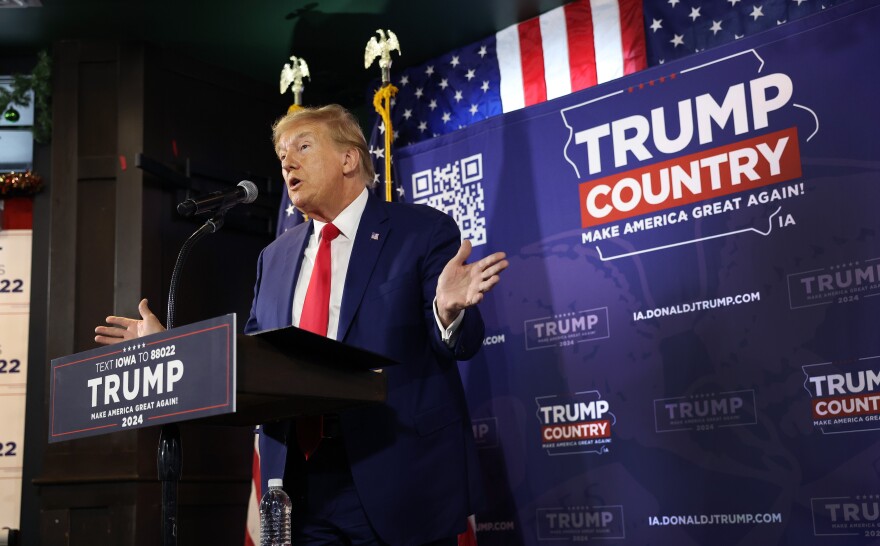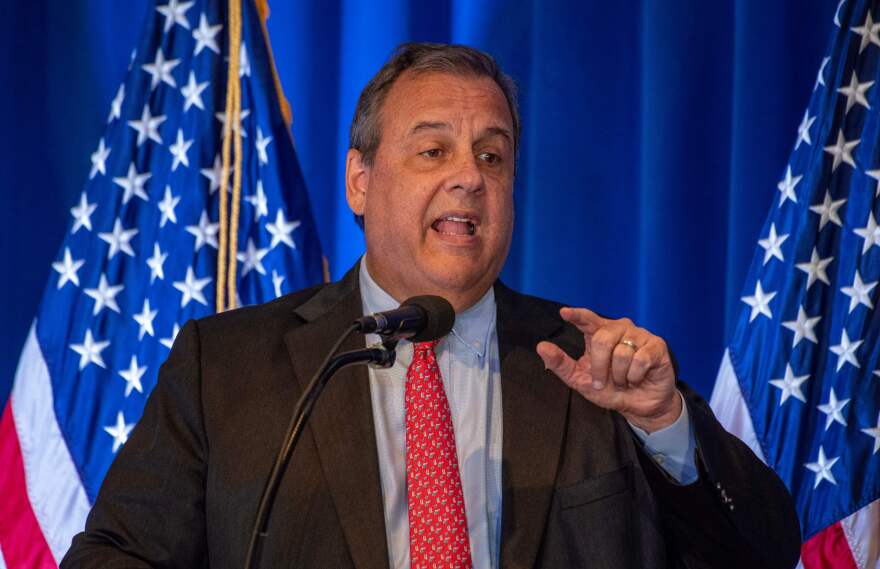Twenty years ago, about 80% of Republicans trusted U.S. elections.
Things have gone downhill since then, driven by presidential defeats in 2008 and 2012, and former President Donald Trump's false insistence that the 2020 election was stolen from him.
Now, that trust number is reversed. Just 22% of Republican voters have high confidence that votes in 2024 will be counted accurately, according to a June poll by the Associated Press and the National Opinion Research Center.
That means it's extremely difficult (though not impossible) to be a viable GOP candidate in a statewide or national primary race without at least nodding to the possibility of election shenanigans.
And candidates in the Republican presidential primary have generally gotten the memo, though each has found a different way to tap into those election anxieties. Here's where the current notable presidential hopefuls, including Trump, stand on issues of democracy and election integrity.
Donald Trump

Trump, who sought to overturn an election loss and has said he'd punish his political foes if returned to power, is an antidemocratic force in U.S. politics. Dating back more than a decade, Trump worked to undermine trust in America's election systems (a tactic of authoritarian regimes).
2020 supercharged his voting falsehoods. States turned to more mail voting in response to the COVID pandemic, and Trump used the powers of the presidency to try to restrict access to that voting method.
He then seized on those changes to falsely claim the system was rigged against him when he lost, and he set into motion a plan to try to stay in power against the will of the voters, leading to multiple criminal indictments. He asked state officials to "find" votes and to stop counting rightfully cast ballots in order to help him.
Importantly, Trump's election claims were not only bogus, but federal prosecutors allege he almost certainly knew they were untrue and continued to spread them even as some fellow Republicans worried about the unrest and violence that could follow. In the time after voting ended, Trump-appointed U.S. Attorney General William Barr investigated the many voter fraud claims the president was pushing and concluded there was nothing to them.
On the day electoral votes were set to be counted in the U.S. Capitol, a violent mob of Trump's supporters overtook the building, leading to a woman being shot by police, and more than 100 police officers injured.
"We fight like hell. And if you don't fight like hell, you're not going to have a country anymore," Trump told the crowd gathered at the Ellipse, before they marched down Pennsylvania Avenue.
Trump has defended his actions that day, and pleaded not guilty to the charges against him.
But in the time since, Trump has only doubled down on his false and antidemocratic rhetoric. Late last year, he posted online that "massive fraud" like what he claims happened in 2020 should allow "the termination of all rules, regulations, and articles, even those found in the Constitution."
Ron DeSantis

For long after the 2020 election, DeSantis dodged questions about Trump's false election fraud claims and was hesitant to recognize Joe Biden's win. That is, until a few months ago, when he said "of course" Trump lost. In the years DeSantis didn't weigh in on the 2020 election, though, he often supported candidates who denied the results of the election.
As Florida governor, DeSantis has signed a slew of restrictive voting bills that he says protect election integrity but that voting rights advocates say disenfranchised thousands of voters — and most affected Black Floridians.
In 2018, Florida voters approved a ballot measure restoring voting rights to most Floridians with a prior felony conviction. But before the measure went into effect, DeSantis signed legislation requiring these individuals to fulfill every part of their sentence, including paying any fees or fines, before getting their voting rights back. However, the state has yet to create any sort of database of how much these individuals owe. As a result, advocates say thousands of Floridians have not had any clarity on how or when they can get their rights back.
Last year, DeSantis pushed for a new state agency that specifically investigates election crimes. The office's first arrests were very controversial. In a big press event, DeSantis announced the state arrested roughly 20 people who voted in 2020 who were not eligible to regain their voting rights after a felony conviction. Many of these individuals say they believed they were able to vote because election officials gave them voter registration cards, and attorneys representing some of them have accused the state of entrapping their clients.
Both in 2021 and this year, DeSantis has signed legislation creating more mail voting restrictions. This year's law also placed new rules on third-party voter registration groups, which historically have been a key way people of color in Florida have registered.
Nikki Haley

The former U.N. ambassador and South Carolina governor has been publicly critical of Trump's actions after losing the 2020 election. "Many of his actions since the election were wrong and will be judged harshly by history," Haley wrote in a 2021 Wall Street Journal op-ed.
NBC News reported that a voter at an Iowa event in May asked Haley how she would make sure there's a "fair and speedy" trial for those charged in the Jan. 6 attack. According to NBC, Haley replied, "I don't know enough about each individual [rioter] but that's my rule: If you break the law, you pay the price."
Still, Haley has emphasized that she is "proud of the successes of the Trump administration."
And while she has acknowledged Biden's victory in 2020, Haley has also supported the campaigns of Republicans who have cast doubt on the election results, including Adam Laxalt, the former Nevada state attorney general who lost a Senate race; and Don Bolduc, the retired U.S. Army general who lost a Senate race in New Hampshire.
Haley's campaign website describes her as a "vocal advocate for voter ID," and she often highlights the risk of voter fraud in elections, despite proven voter fraud being exceedingly rare. "In the America I see, everyone has full confidence in our elections. Voter ID will be the law of the land just like we did in South Carolina," Haley said at her campaign kickoff speech in February.
Vivek Ramaswamy

Prior to his presidential run, Ramaswamy criticized Trump's actions after his 2020 election defeat. In his 2022 book, Nation of Victims, Ramaswamy called Jan. 6 "a dark day for democracy" and labeled Trump a "sore loser" who pushed "weak" claims of election fraud.
Republicans, he wrote, had "placed grudges about elections at the core of party identity."
More recently, however, candidate Ramaswamy has leaned into those sorts of grudges. During Wednesday night's primary debate, he repeated several conspiracy theories, including that Jan. 6 appears to be "an inside job" and that the 2020 election was "stolen" from Trump by Big Tech platforms that he has alleged interfered through their censorship.
Ramaswamy has proposed far-reaching, if implausible, reforms to voting policies.
When asked on NBC's Meet the Press how he would've handled Vice President Mike Pence's role on Jan. 6, Ramaswamy said he would've used the "historic opportunity" to pass sweeping measures such as "single-day voting on Election Day," thereby eliminating early and mail voting options, and federal voter identification rules.
"In my capacity as president of the Senate, I would have led through that level of reform, then on that condition certified the election results, served it up to the president — President Trump — then to sign that into law," he said.
Conditioning the transfer of power on the passage of radical and restrictive voter reforms would likely not have found many fans among Democrats in Congress.
Ramaswamy's most unique proposal is what he calls "civic duty voting." It's a constitutional amendment that would increase the U.S. voting age from 18 to 25, apart from those who serve at least six months in the military or as a first responder, or pass a civics test.
While critics note it would disenfranchise tens of millions of U.S. citizens, Ramaswamy defends his plan in part by quoting the "IKEA effect," in which "psychologists have found people put greater value in things that they have to work for or invest in."
Chris Christie

Christie, a former Trump ally, has in recent years explicitly and repeatedly condemned the former president for his false claims about the 2020 election. "You can't undercut our democracy with no facts," Christie told CNN in 2021, explaining his break with Trump.
Christie has said Trump's attempts to overturn his election defeat should disqualify him from holding the Oval Office again, and Christie, a former federal prosecutor, told the NPR Politics Podcast in September that the special counsel's federal election subversion case against Trump is an "absolutely appropriate [case] to have been brought."
Christie was a two-term governor of New Jersey in the 2010s, and during his tenure vetoed a few Democratic-backed voting bills. One was a 2016 automatic voter registration measure, and during a news conference, Christie reportedly referred to the proposal as a "cocktail of fraud." In 2018, now-Gov. Phil Murphy signed legislation to establish automatic voter registration, and there's been no proven widespread voter fraud associated with the state's system since then.
— Benjamin Swasey
Copyright 2023 NPR. To see more, visit https://www.npr.org.





